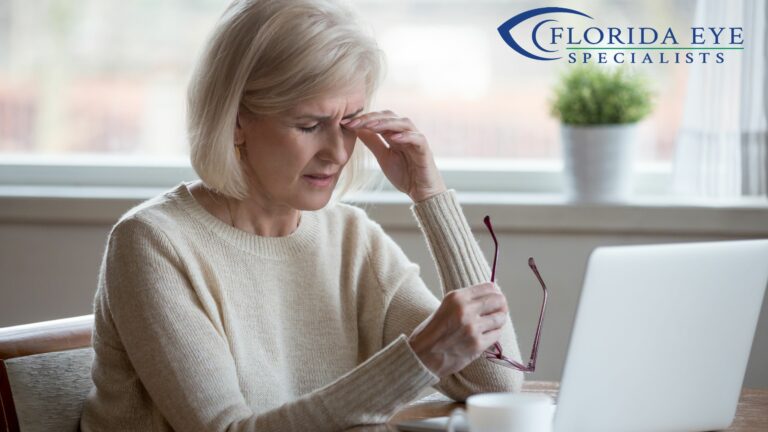Written by Donald A. Barnhorst, Jr., M.D., Florida Eye Specialists
Do Dry Eyes Get Worse In Winter?
As temperatures drop, our eyes are exposed to cold, dry wind and air, making dry eyes in winter all too common. Dry eye symptoms can also occur as your heating system runs during the winter, which removes the moisture from the air in your home.
Fortunately, there are easy steps you can take to keep your eyes comfortable and healthy in the winter months. Know what precautions to take to maintain your eye health and avoid symptoms like red, itchy eyes as cold weather moves in. Here are the top tips to prevent winter dry eye.
Symptoms of Winter Dry Eyes
Dry eye is a common condition that occurs when our eyes do not produce tears properly due to an imbalance of oil, water, and mucus. Some symptoms you might experience include watering eyes, increased sensitivity to light, and feeling like there is something in your eyes. You may also have blurry vision, eye fatigue, redness, or stringy mucus in or around your eyes.
Tips for Soothing Dry Eyes In Winter
Use Artificial Tear Drops
Keep eye drops handy during the colder months of the year to soothe your irritated eyes as needed. While no single brand works best for all forms of dry eye, here are some of the best over-the-counter brands.
Best Eye Drops for Dry Eyes In Winter
- Systane Ultra
- Refresh Optive Mega-3
- Retaine MGD
- Optase Dry Eye Intense Drops
- Oasis Tears Plus
How Often to Use Eye Drops
How often to use eye drops depends on the severity of your symptoms. We recommend you apply eye drops once each morning or before going to bed in the evening. This daily process will help your eyes become more lubricated and eliminate painful symptoms.
Use a Heated Eye Mask
Using a heated eye mask for dry eyes is also a proven remedy to eliminate symptoms of the condition. Heated eye masks are a safe and effective way to reduce tear evaporation, improve oil gland function and stabalize the tear film.
Be Mindful of Makeup and Cosmetic Products
Women are more prone to dry eye. Certain makeup products can make symptoms worse, which is why it’s important to be vigilant about ingredients and opt for products without harsh chemicals.
Makeup Tips to Prevent Dry Eyes
- Keep in mind that retinol and anti-aging creams can harm delicate oil glands under the eyelid.
- Be cautious about eye shadows, and avoid powders and glitter.
- Consider using a primer to minimize contact with your eyes’ tear film.
- Avoid using liquid eyeliner or waterproof mascara, as they often require harsh chemicals for removal.
- Regularly clean your eye brushes to prevent the buildup of bacteria.
- When it comes to removing your makeup, avoid products with alcohol and opt for natural options like coconut oil or argan oil, as well as micellar wipes.
See a Dry Eye Specialist in Jacksonville, FL
Finding the right dry eye treatment can drastically improve your eye discomfort. The key is breaking the cycle of irritation and inflammation by determining the cause of your dry eye. Don’t ignore your symptoms — dry eye can lead to eye infections and potentially impact your vision, even preventing you from wearing contact lenses. Schedule an appointment at any of our thirteen Jacksonville, FL locations, including our Ponte Vedra Beach and Nocatee offices. Your dry eye specialist will begin creating a treatment plan that best suits your type of dry eye.
About Donald Barnhorst, Jr., M.D.
Donald Barnhorst, Jr., M.D., is a Ponte Vedra resident and board-certified ophthalmologist at Florida Eye Specialists. Read Dr. Barnhorst’s bio here. To schedule an appointment with Dr. Barnhorst, call 904-564-2020.

